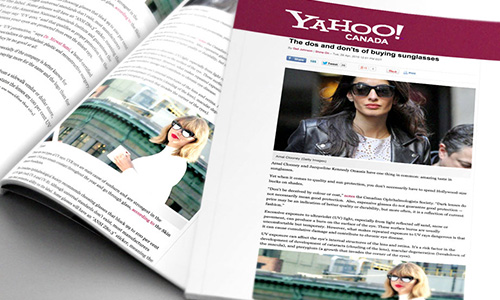Dr. Mirwat Sami was recently featured on ‘Yahoo! Canada’ in an article highlighting the best things to look for when purchasing sun glasses. It was originally published at www.ca.shine.yahoo.com.
Amal Clooney and Jacqueline Kennedy Onassis have one thing in common: amazing taste in sunglasses.
Yet when it comes to quality and sun protection, you don’t necessarily have to spend Hollywood-size bucks on shades.
“Don’t be deceived by colour or cost,” notes the Canadian Ophthalmologists Society. “Dark lenses do not necessarily mean good protection. Also, expensive glasses do not guarantee good protection — price may be an indication of better quality or durability, but more often, it is a reflection of current fashion.”
Excessive exposure to ultraviolet (UV) light, especially from light reflected off sand, snow or pavement, can produce a burn on the surface of the eye. These surface burns are usually uncomfortable but temporary. However, what makes repeated exposure to UV rays dangerous is that it can cause cumulative damage and contribute to chronic eye disease.
UV exposure can affect the eye’s internal structures of the lens and retina.
It’s a risk factor in the development of development of cataracts (clouding of the lens), macular degeneration (breakdown of the macula), and pterygium (a growth that invades the corner of the eyes).
There are two types of UV rays: UVB rays are main cause of sunburn and are strongest in the summer; UVA rays remain constant throughout the year and go through glass, according to the Skin Cancer Foundation.
The Canadian Ophthalmological Society recommends choosing glasses that block 99 to 100 per cent of UV light (both UV-A and UV-B).
Although universal standards don’t exist, most manufacturers state their protective ability on the label. Some glasses will have an “ANSI Z80.3” sticker, meaning the manufacturer paid a licensing fee to the American National Standards Institute and guarantees the product meets set criteria. A label may say “UV 400,” and that qualifies as proper protection too: the number refers to nanometres and means your eyes are protected from even the tiniest rays.
“That’s not sufficient, and in fact may mean they’re no good at all.”
“Approach fancy designer brands with caution, especially if the company is better known for handbags than eyewear,” she adds. “You’re probably paying more for the name and the logo than for the quality of the lens and glasses.”
However, it’s not necessarily a good idea to buy your shades from a sidewalk vendor or dollar store, either. Many reputable shops will give you a guarantee card that states the lenses are 100 per cent UV protected and keep of photometer on hand to test whether the lenses are providing that vital protection. You can Materials matter, too.
“All better-quality non-prescription polarized sunglasses sold through optical stores are 100 percent UV absorbing,” says Mark Mattison- Shupnick, a New York City master optician and editorial advisory board member of AllAboutVision.com. “Lenses that are polycarbonate are usually UV absorptive. However, many cheap sunglasses use a material called triacetate. This material absorbs only about 40 per cent of the UV rays. Lenses may also be made of other acrylic materials, which will vary from partially to fully absorbent.”
Sami also suggests looking for lenses that are tapered.
“Good lenses require careful manufacturing control that includes decentering, or tapering the lenses,” she says.
“Inexpensive plastic lenses will strain your eyes. You might not notice it at first, but after a while, subtle fatigue or even severe eyestrain and headaches will set in.”
If you spend a lot of time in the sun, it’s recommended that you buy wrap-around glasses to prevent the sun from entering your eyes from the sides.
“Wraparound lenses are best, but if that’s not an appealing style, look for close-fitting glasses with wide lenses,” Sami says.
“Avoid models with small lenses, such as John Lennon–style sunglasses.” The tint of the lens has nothing to do with the UV protection of the glasses, Sami notes. “Dark lenses without adequate UV protection are actually worse for your eyes than not wearing glasses at all, because the dark tint causes your pupils to become dilated, exposing your eyes to more harmful UV light,” she says.
You can see the original article at www.ca.shine.yahoo.com


